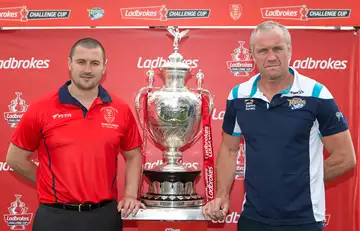Analysis: Seven ways Leeds dismantled Hull KR at Wembley

‘Awesome’ is a word which is overused in sport, but it would have been an apposite term for the performance of the Leeds Rhinos at Wembley in Saturday’s Challenge Cup final.
Brian McDermott’s team beat Hull KR 50-0 to win the Cup, but it did not happen by chance or accident. At the post-match press conference, McDermott spoke of the respect that his team maintained for Hull KR throughout their preparation, as well as the amount of “boring, technical work” which goes into a performance like that.
The Rhinos monstered Rovers, but there were seven factors which were key to their stunning succes.
Tactics
Leeds had clearly put a great deal of thought into the parts of the KR defensive line they were going to attack, and how they were going to do it. The first half saw a string of narrow side attacks, particularly on Rovers’ left edge.
The short side attack opened up the Robins’ right side, with Rovers expecting Leeds to kick there. Attacking the narrow side on the last play forced tired Rovers’ edge defenders to have to defend again after they had relaxed. It proved a devastatingly effective tactic in the first half, draining energy from key Rovers attackers and creating tries for the Rhinos.
Targets
Although teams will always deny targeting individuals, it was clear that Leeds saw Kieran Dixon and possibly Kris Welham as vulnerable points in the Rovers defence. Welham struggled against Kallum Watkins all day (who wouldn’t?), but Dixon really did not have a good game at all.
Dixon made mistakes with almost every touch, and Leeds targeted him time and time again with kicks. He was never allowed to settle, and was given a real lesson in ruthlessness by the Rhinos.
Territory
In the first half in particular, Leeds were able to dominate territory to a ridiculously intimidating degree. This was not just a result of intelligent kicking from the likes of McGuire and Sinfield, but also of the effort put into chasing, tackling and defensive organisation.
Brian McDermott was especially pleased with how his back row unit of Carl Ablett, Brett Delaney and Steve Ward played, and their effort to back up the pivot players’ kicks was superb. Rovers could never make any significant yards coming away from their own line.
KR completed sets, but they completed them in their own half, and the kicking game of Maurice Blair and Albert Kelly was rendered anodyne and unthreatening as a result.
Kicking
Leeds showed judgement and experience when it came to the type of kick, the place being kicked from, and the area of the field being targeted with the kick. Every time Sinfield or McGuire kicked the ball, it was to fulfill part of a plan. Kicks were often from dummy half, and frequently early in the tackle count, just to keep the Robins back three on their toes.
Too often when Rovers kicked, they were simply getting through another set, rather than working towards a specific plan.
Execution
Leeds hardly ever make basic errors, which is the sign of a really great side. When the line is at their mercy, they execute their plays properly and make sure that they score. Often complex attacking moves are carried out with perfect timing, and, crucially, hardly any passes get dropped.
The contrast with Rovers at Wembley was sharp. When Rovers did manage to work some attacking opportunities, they dropped the ball. Tyrone McCarthy dropping a pass near the line in the first half really helped to seal the direction of momentum in the game.
Every time a pass was dropped, Rovers’ suffered a similar drop in energy and morale. That only led to more mistakes, and the Rhinos were ruthless in how they exploited those errors. Rovers ended up trapped in a death spiral from which they never recovered.
Selection
Brian McDermott obviously has a greater depth of squad, with more genuinely international and world-class players to choose from at his club. But he also made the right calls for the occasion.
Naming Adam Cuthbertson as a nominal dummy half could have come straight from the pages of Chinese philosopher Sun Tzu and his ‘Art of War’. A perceived weakness is masked by a selection which forces the oppostion to react, changing from a weakness to a possible strength.
Having an extra ball carrying forward on the pitch in the first half meant that Leeds could tire out the Rovers pack more effectively. They were bigger and more aggressive and it showed.
In contrast, Rovers coach Chris Chester made two calls which, with hindsight, were probably wrong. First, James Green‘s energy, size and aggression would have been useful against the Rhinos. Mitch Allgood is returning from a lengthy spell out with injury, and he never managed to impose himself on the Leeds front row. Green has been in fine form recently.
Perhaps more crucially, Chester also opted for the mercurial but brittle brilliance of Kieran Dixon at full-back. Robins’ cult hero Ben Cockayne was unfortunate to miss out on the occasion after his loyal service to the club. His steadiness in defence, his heart and his aggression would also have been useful at Wembley. He could perhaps have been a good bench option too, with his liveliness and ability to play in several different positions. We’ll never know now.
It might also have been an idea to have Dane Chisholm in there as another creator.
Leeds may have to go through a lot of “boring, technical” work to be as good as they are, but from their systems pure rugby league poetry emerges. They were truly awesome at Wembley.